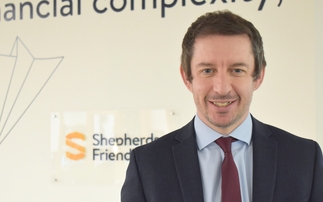
In the fourth in a series of articles for Pride 2023, Jaskeet Briah speaks to Graham Lawson, protection analyst at Royal London, about his experience working in the protection industry as a member of the LGBTQ+ community.
Generally, Lawson's experience in the sector has been a "fairly positive" one following an array of support for the LGBTQ+ community from Royal London, including the launch of a Pride network and Pride marches by the insurer.
"We do lots of different things to bring everybody together and make employees feel more inclusive," Lawson says. "We also have lots of training courses that people can do around diversity - not necessarily just diversity around LGBTQ+ people, but diversity in all shapes and sizes."
Overall, support and representation for the LGBTQ+ community is gradually improving he states, but there is more work to be done before the industry reaches a place of complete inclusivity.
Lawson notes that support for customers in the LGBTQ+ community is "getting better", particularly around certain application questions: "We don't ask about sexuality on applications, and when we write to doctors, we specifically ask them to exclude that information."
"As we learn more, customers are being treated better than they potentially were before, but there's a lot to be done from an industry level to make everybody feels represented and feel more included."
Specifically, application questions should be refined to incorporate further inclusivity: "Not just with insurance companies but within any application for any industry, one of the first questions is about the title of a customer and the options are only Mr or Mrs - there's not really much variation in that," Lawson explains.
However, adding Mx as a gender-neutral title is one way of opening up protection to more members of the LGBTQ+ community, Lawson details.
It can also be "tricky" asking certain questions to customers who are transgender, Lawson says. However, questions may arise around a customer's sex assigned at birth, for example if there is a family history of cancers that may specifically relate to one sex.
"We have to think about how we ask these types of questions, if at all. We must be sensitive and know how to ask these questions respectfully and in the right way, particularly for transgender and non-binary customers."
By implementing greater inclusivity within applications, customers will ultimately believe they will be dealt with respect, Lawson explains.
"If a customer applies for a product and they're seeing very strict options when it comes to questions, they're going to question whether or not they'll be dealt with in the most respectful way. If we can make things more inclusive, that then helps people get on board with us."
Equal voices
When any business decisions are being made around LGBTQ+ issues, it's important to bring in voices of those in the community to understand how they feel about these decisions and whether the decisions being made are the right ones.
"Quite often in the media there are people debating on trans issues and pronouns, but there's nobody from that community there that's actually got a voice," Lawson says.
When making any changes in protection around this topic, Lawson emphasises the importance of bringing these individuals into the decision-making process.
"It's all well and good that a bunch of us who are potentially not within that community are making these decisions and thinking these are the things to do, but we need to bring those people in as well because they might have different preferences," he says.
For example, members of this community might prefer for their medical information to be looked at in a particular way or they might have different preferences for title options within applications that might not have been thought of previously, Lawson notes.
"We're not going to know how these people feel unless we get them involved and hear about their experiences as well; we're not going to do the right thing unless we're reaching out to these people."
He adds: "That's why representation in general, not just with LGBT people but across the board, whether it's race or disability, is always important because you need the voices of people who are affected."
Adviser training
Across financial services, the advice process will seem less daunting if advisers are trained on issues being faced by customers who are in LGBTQ+ or minority groups.
"If financial adviser agencies are more tailored to deal with people in these particular communities, customers will know they can go to these advisers and that they will be dealt with respectfully," Lawson explains.
Doing this will go a long way to help engagement with customers in these communities, he adds, and it will make it "a lot easier for customers to go to advisers and know that they're going to be recommending the best products and insurers for them."
"There's not a one size fits all solution, and companies should make it as easy as possible to do business with LGBTQ+ customers," Lawson concludes. "If we eliminate small barriers, like the issue around titles, it will go a long way in making people feel represented."













